
Overview
Millennial buying habits for DTC brands are defined by a pronounced preference for:
- Personalized experiences
- Sustainability
- Digital engagement
This demographic prioritizes eco-friendly products, embraces subscription services for enhanced convenience, and is significantly influenced by social media in their purchasing decisions. Such trends underscore the imperative for brands to align their strategies with the values and behaviors of this influential group. By adapting to these preferences, brands not only meet the expectations of Millennials but also position themselves for sustained success in an evolving market.
Introduction
Millennials are fundamentally reshaping the marketplace with their distinct buying habits, prioritizing experiences over products and sustainability over convenience. As this influential demographic increasingly seeks brands that resonate with their values, understanding their preferences becomes crucial for DTC companies aiming to thrive. Yet, how can brands effectively adapt their strategies to meet the evolving expectations of millennials, particularly as their purchasing power continues to grow? This article delves into insights that will empower brands to align with millennial consumers, ensuring they remain relevant and profitable in a rapidly changing landscape.
Parah Group: Transforming Millennial Buying Habits into Profitable Strategies
Parah Group stands at the forefront of transforming millennial buying habits into effective strategies that significantly enhance conversion rates and average order values for DTC companies. By harnessing data analytics and insights into consumer psychology, the agency develops tailored approaches that resonate deeply with this influential demographic.
For instance, a $30M apparel company collaborated with Parah Group to revamp its homepage, integrating strategies such as gamified progress bars and post-purchase upsells. This strategic redesign resulted in a remarkable 35% and a 10% rise in revenue per visitor.
Similarly, Grab Green, a $15M cleaning product company, experienced an impressive 80% increase in average order value following the implementation of strategic pricing and bundling options.
As millennials increasingly prioritize sustainability, wellness, and personalized experiences, Parah Group ensures that companies align their offerings with these core values, thereby enhancing marketing effectiveness and driving profitability by catering to millennial buying habits.
Successful DTC companies are already leveraging these insights, employing targeted messaging and personalized product recommendations to cultivate loyalty and boost sales.
Looking ahead to 2025, understanding and integrating the preferences of the younger generation will be imperative for DTC companies aiming to thrive in a competitive landscape.
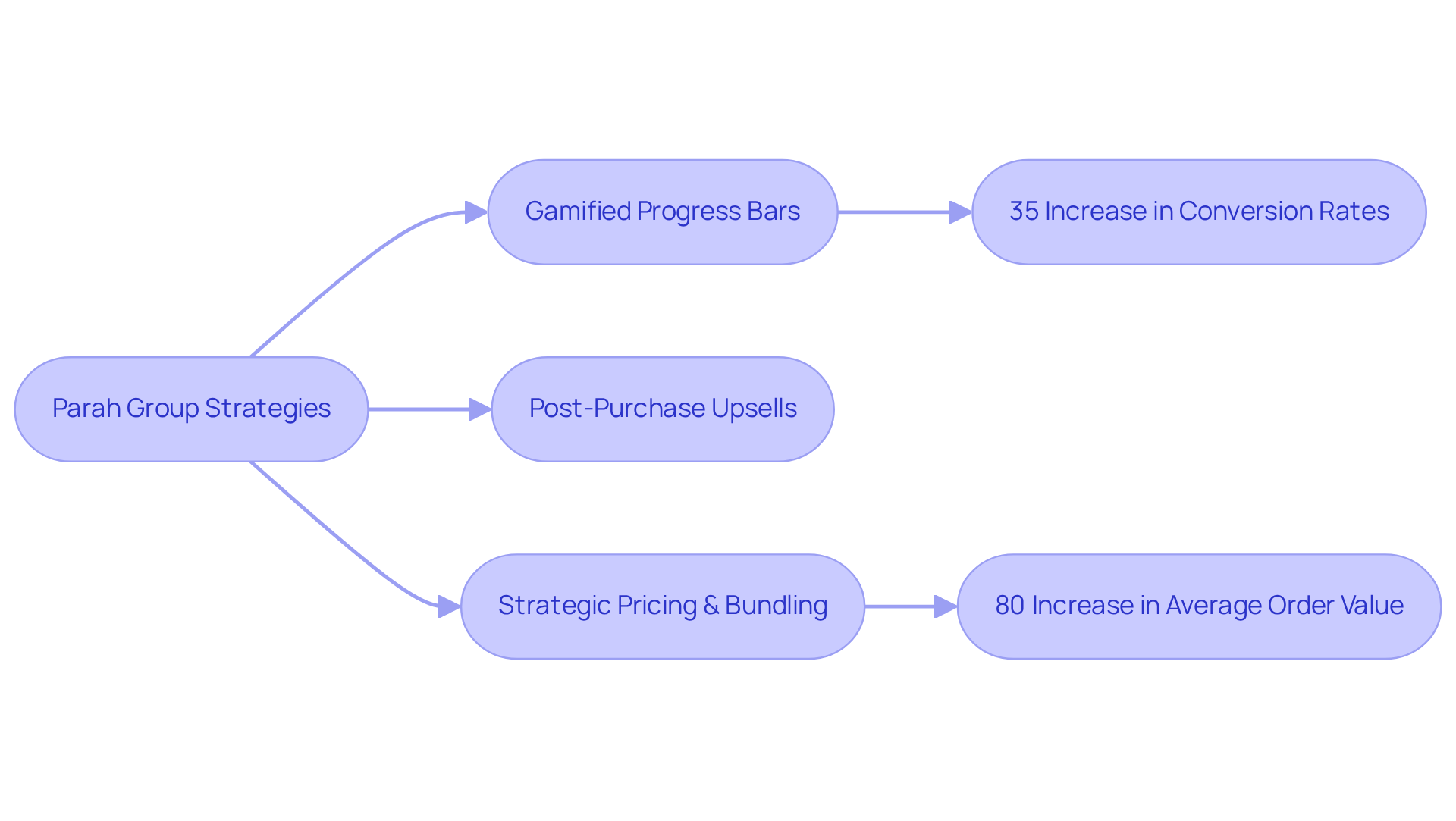
Experience-Driven Purchases: How Millennials Favor Experiences Over Products
Millennials are increasingly prioritizing experiences over physical products. Studies indicate that 72% prefer spending on events or activities rather than material goods. This trend underscores the necessity for companies to develop marketing strategies that align with millennial buying habits by fostering emotional connections and creating memorable experiences instead of merely highlighting product features.
For instance, hosting exclusive events or offering experiential packages can significantly enhance customer engagement and loyalty. Successful campaigns, such as Lululemon's community-focused events, demonstrate the effectiveness of experiential marketing in attracting consumers by aligning with millennial buying habits.
Furthermore, companies like Airbnb have flourished by offering genuine, local experiences, producing over $90 billion in U.S. economic impact in 2024. By aligning their offerings with the values and preferences reflected in millennial buying habits, companies can cultivate deeper connections and drive sustained growth.
To execute these approaches, brands should consider that resonate with their target audience, ensuring that each interaction feels personal and engaging.
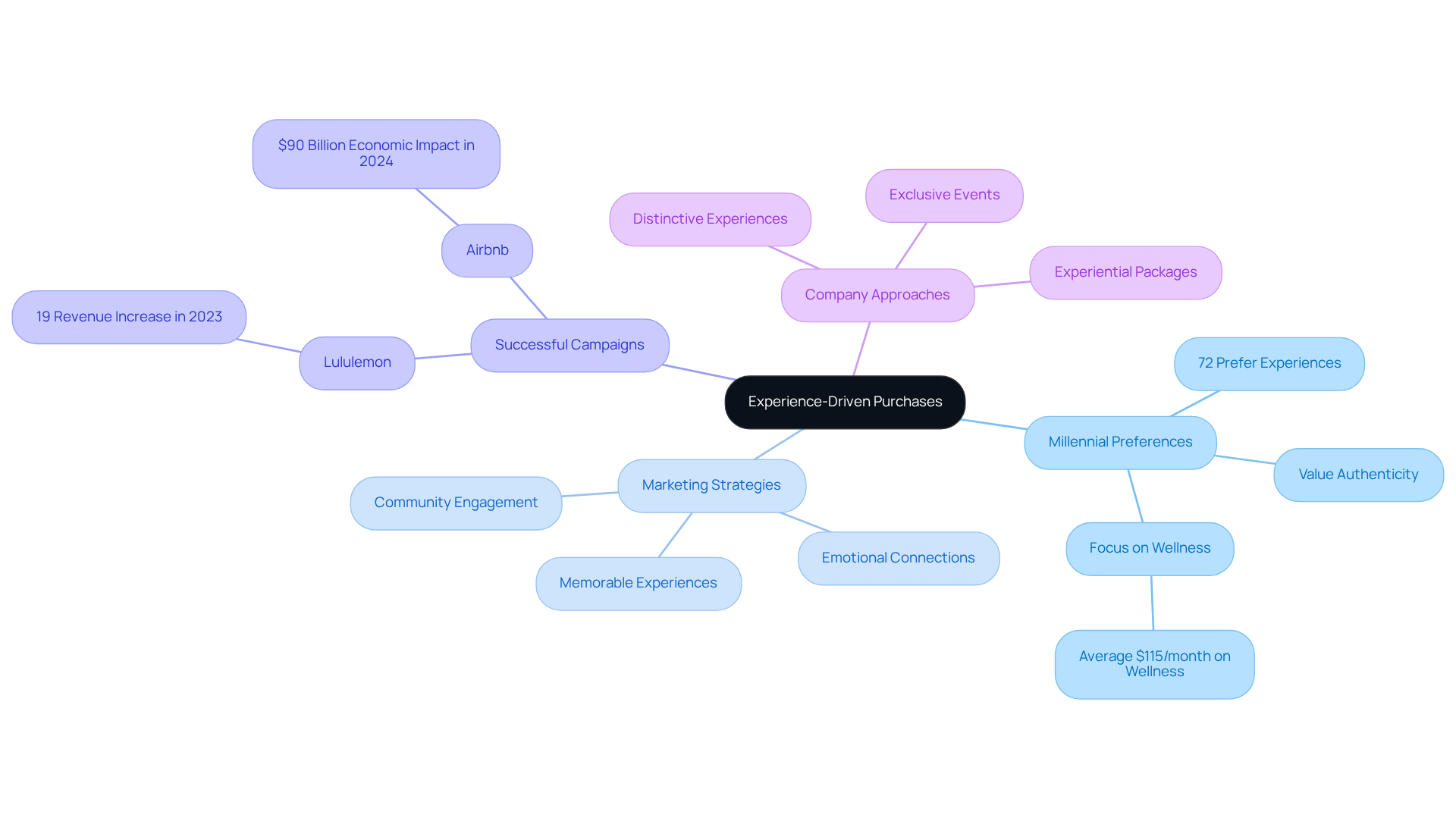
Subscription Services: The Millennial Preference for Convenience and Flexibility
Millennial buying habits indicate that they are at the forefront of the subscription economy, with 39% relying on subscription services for their everyday needs. This significant trend, driven by millennial buying habits, is propelled by a desire for , enabling consumers to access products without the burdensome commitment of ownership.
Brands have a unique opportunity to capitalize on this shift by offering tailored subscription plans that deliver value and foster customer loyalty. Options such as:
- Curated boxes
- Exclusive member benefits
can effectively enhance this connection. Industry leaders assert that prioritizing convenience and flexibility in marketing strategies is essential for engaging with this generation and understanding millennial buying habits to ensure sustained interaction.
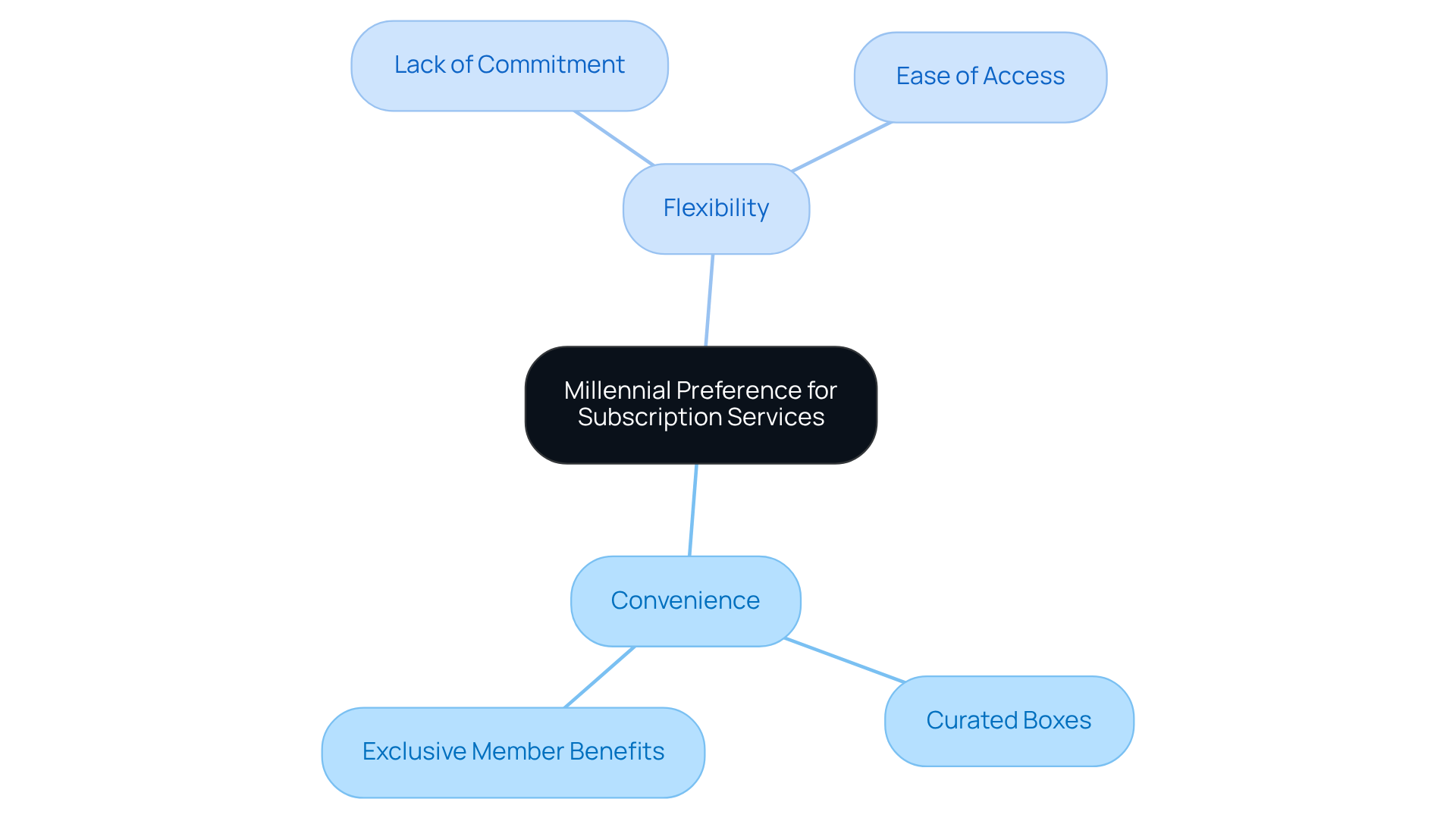
Eco-Conscious Choices: The Impact of Sustainability on Millennial Spending
Sustainability is a pivotal factor influencing the purchasing decisions of younger generations, with a striking 73% expressing a willingness to pay a premium for eco-friendly products. Brands that prioritize sustainable practices and transparently communicate their initiatives are well-positioned to cultivate trust and loyalty by aligning with millennial buying habits. This commitment can manifest through the use of , ethical sourcing, and the promotion of environmental initiatives within marketing campaigns. By adopting such practices, brands not only enhance their credibility but also align themselves with the values of a conscientious consumer base, which can significantly influence millennial buying habits towards more responsible spending.
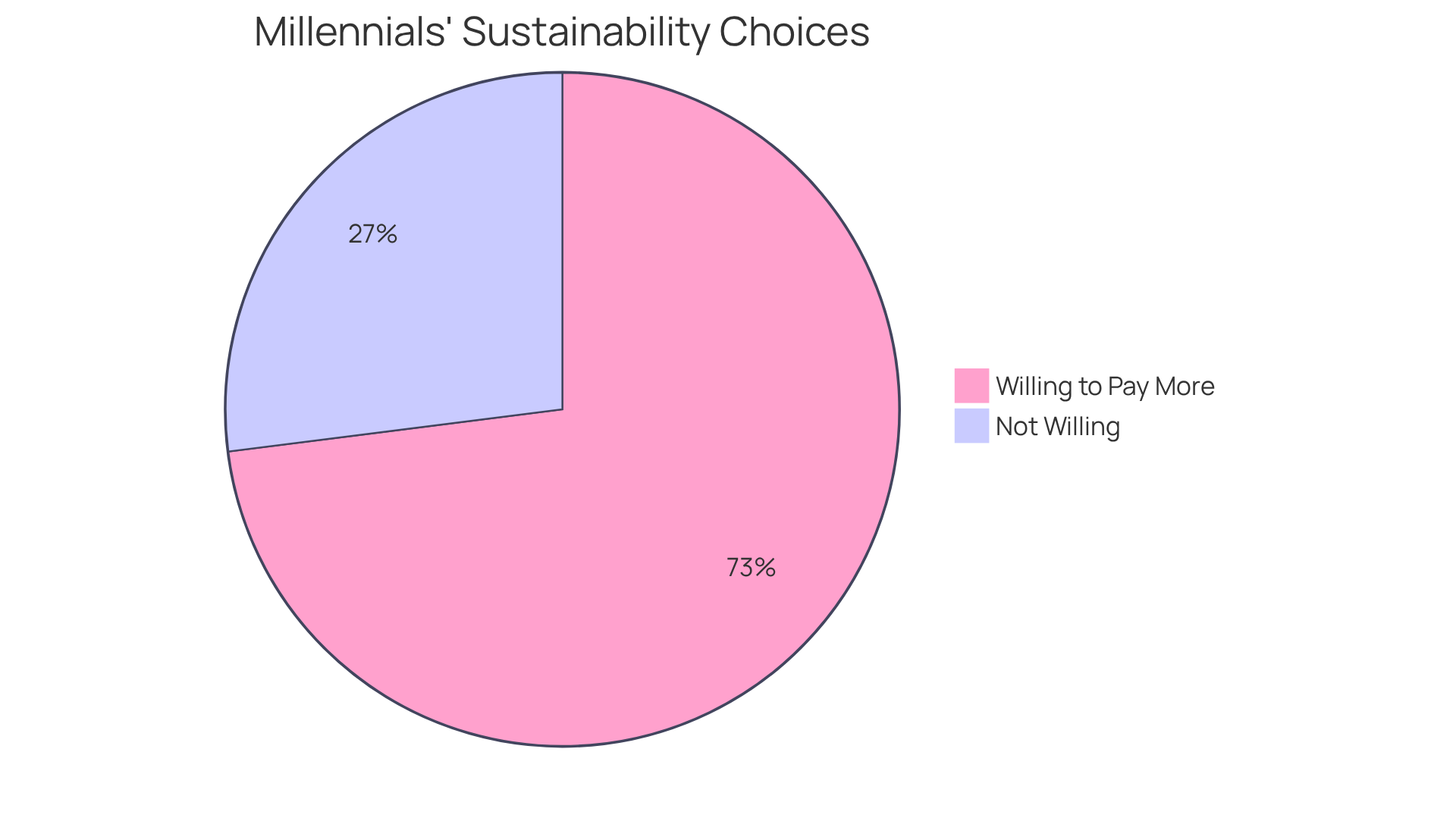
Digital Shopping: The Shift Towards Online Platforms Among Millennials
Millennial buying habits show that, as digital natives, they have a pronounced inclination towards online shopping, with over 67% preferring e-commerce platforms to traditional retail. This significant shift compels companies to prioritize investments in user-friendly websites and mobile optimization to better align with millennial buying habits.
Seamless checkout processes are essential, as they cater to millennial buying habits that increasingly seek convenience and efficiency in their shopping experiences. Furthermore, leveraging social media for direct sales not only amplifies visibility but also fosters engagement, which aids in understanding millennial buying habits and helps them discover and purchase products.
Effective strategies encompass:
- Enhancing mobile interfaces
- Ensuring rapid loading times
- Implementing intuitive navigation
All of which substantially elevate the online shopping experience by aligning with millennial buying habits. To optimize profitability, DTC companies should adopt comprehensive Conversion Rate Optimization (CRO) strategies, akin to those employed by Parah Group, which include:
- Rigorous A/B testing
- Data-driven decision-making
- The alignment of paid ads with landing pages
This holistic approach guarantees that companies not only attract traffic but also convert visitors into loyal customers. By executing these strategies, companies can enhance their online visibility and effectively cater to the desires of younger audiences.
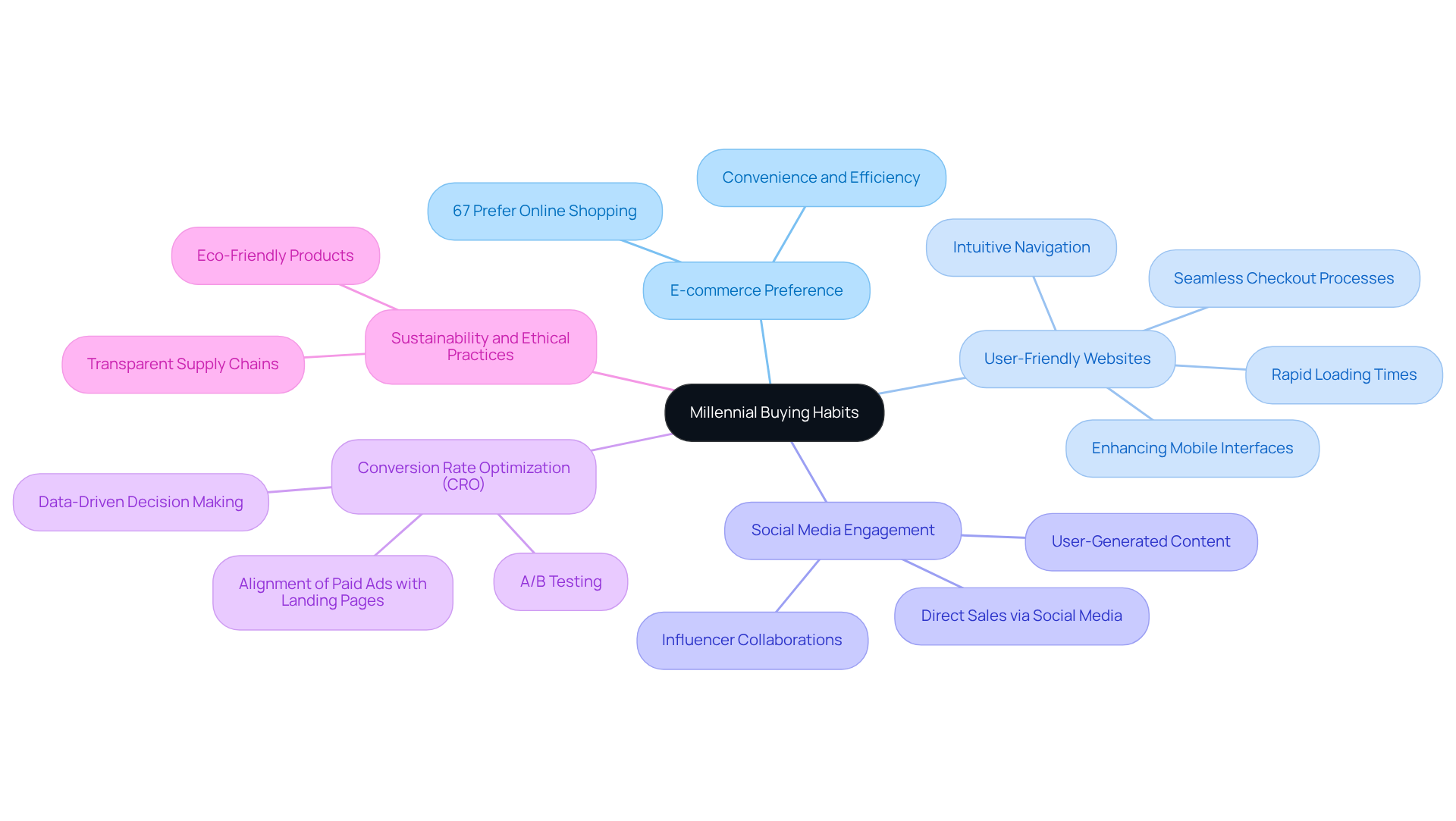
Social Media Influence: How Platforms Shape Millennial Buying Decisions
Social media platforms play a crucial role in influencing millennial buying habits, with 56% of millennials indicating that they have made purchases based on social media recommendations. Brands must prioritize the creation of engaging content, collaboration with influencers, and the use of targeted ads to strengthen their presence on platforms such as Instagram and TikTok. This strategy not only increases brand awareness but also drives conversions through authentic engagement, as 84% of consumers express greater trust in a company's marketing when it includes (UGC).
Furthermore, the millennial buying habits show that their commitment to social issues significantly impacts their loyalty to brands that reflect their values, with 63% willing to pay a premium for environmentally sustainable products. Effective influencer marketing campaigns, particularly those leveraging micro-influencers, have proven that companies can achieve a superior engagement-to-cost ratio, with 73% of organizations preferring to collaborate with micro and mid-tier influencers for enhanced results.
Additionally, nearly one-third of consumers utilized social media to make purchases and discover new brands last year, underscoring the importance of social media in the buying journey. Case studies from Parah Group illustrate how effective conversion rate optimization techniques can amplify these efforts. For example:
- A $30M apparel company experienced a 35% rise in conversion rates after redesigning their homepage to emphasize social proof and reviews.
- A $15M cleaning product company boosted their average order value by 80% through strategic bundling and pricing tests.
As the purchasing path becomes increasingly interconnected, it is imperative for companies to integrate these strategies into their marketing plans to remain relevant and enhance profitability.
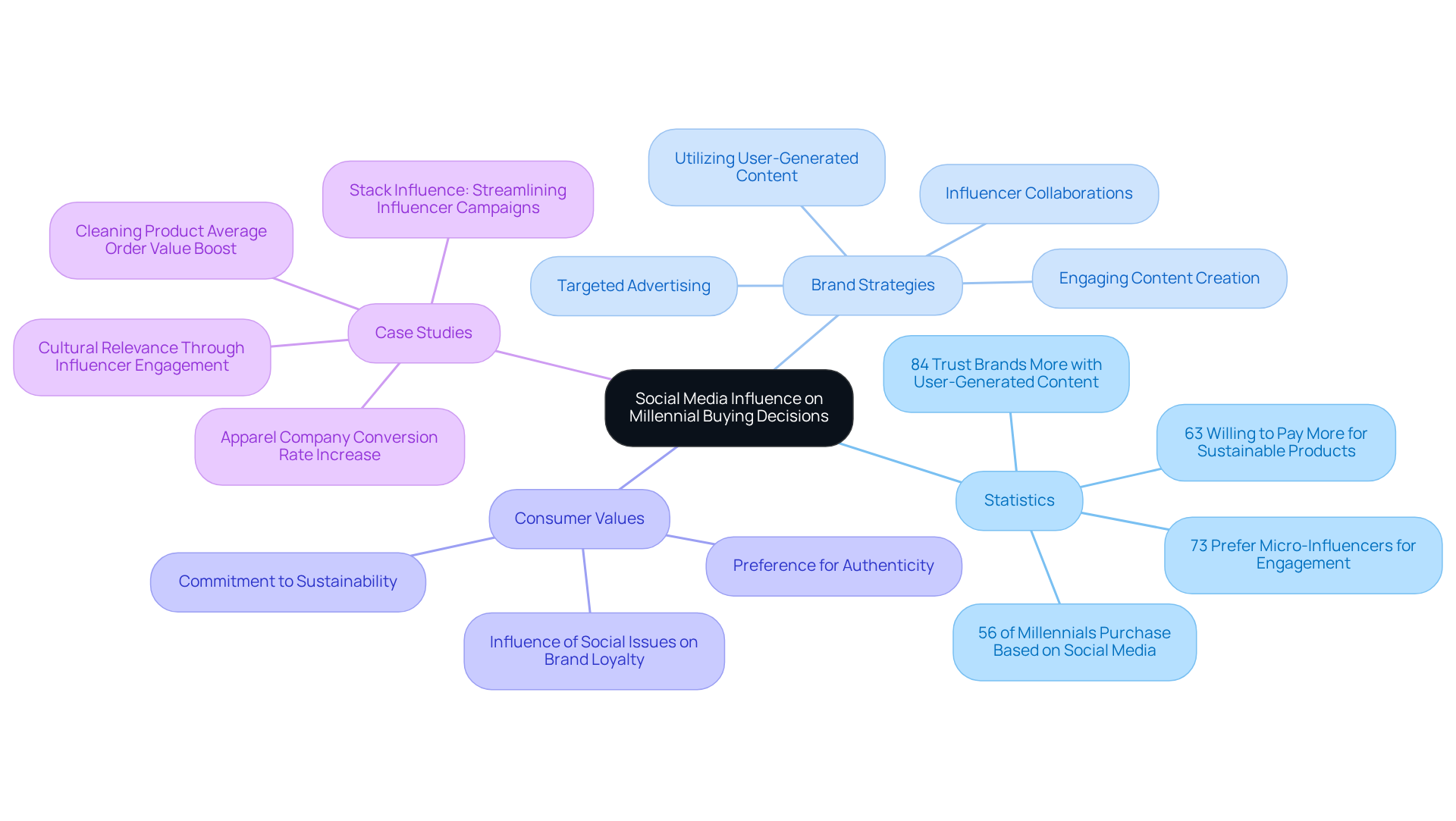
Personalized Marketing: The Key to Engaging Millennial Consumers
Personalized marketing is essential for capturing the attention of millennials. Studies reveal that they are 78% more likely to become repeat customers when presented with tailored offers. Moreover, 60% of shoppers are more inclined to make repeat purchases after a customized shopping experience.
By leveraging data analytics, companies can craft personalized experiences that encompass tailored product suggestions and targeted email campaigns. This strategic approach not only boosts customer satisfaction—65% of individuals report a greater likelihood of loyalty when a company offers a —but also significantly enhances repeat purchases and fosters loyalty.
As consumer expectations evolve, with 71% desiring companies to understand their shopping behaviors over time, utilizing data analytics to enhance engagement will be crucial for DTC companies aiming for success in 2025 and beyond. Additionally, implementing comprehensive Conversion Rate Optimization (CRO) strategies can amplify these efforts.
Companies that focus on optimizing their existing resources through rigorous testing often experience substantial growth and improved conversion rates. However, it is noteworthy that 96% of retailers grapple with effective personalization, underscoring the challenges brands encounter in this domain.
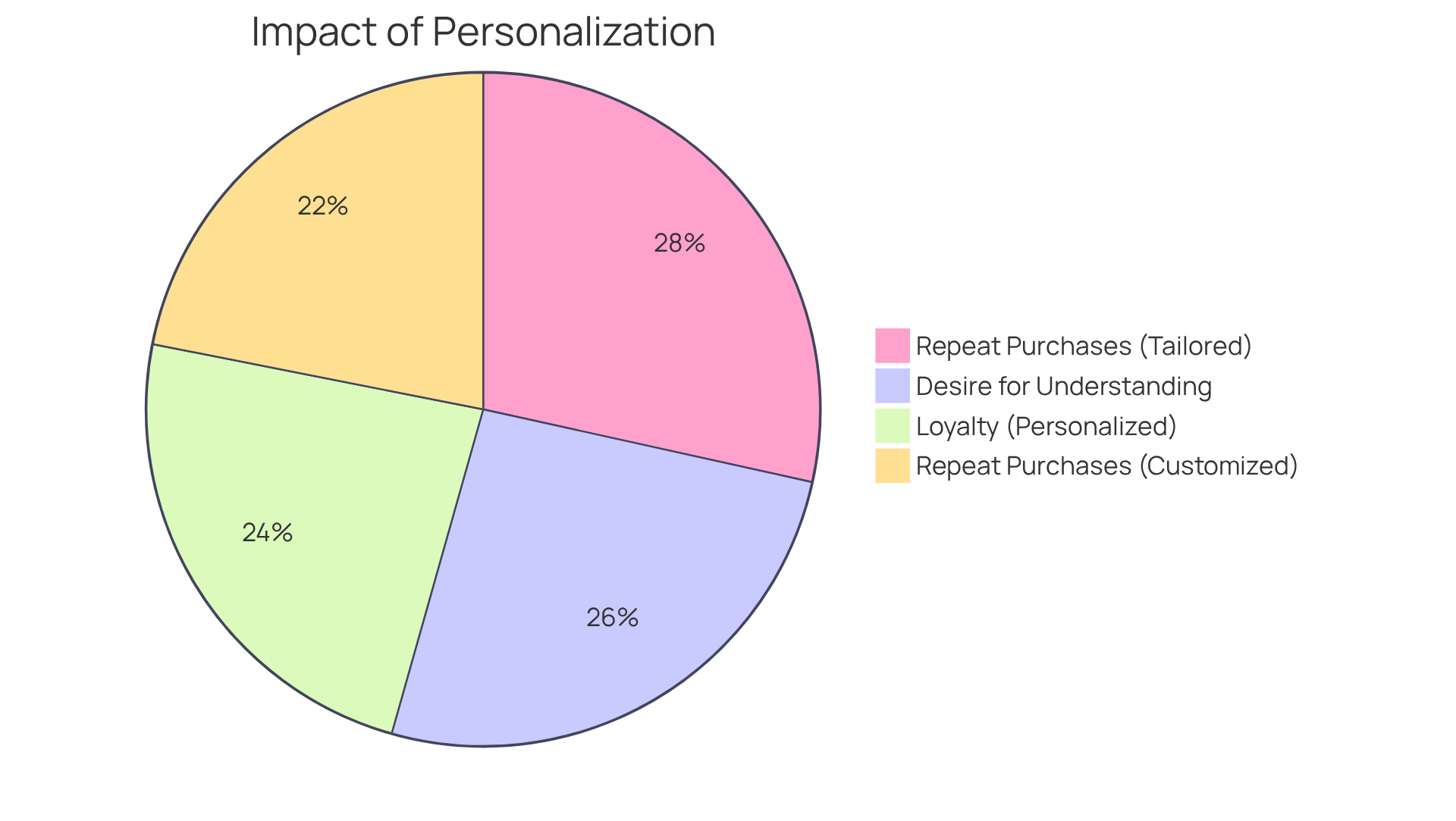
Renting vs. Owning: The Millennial Shift in Consumption Habits
The shift in millennial buying habits shows that they are increasingly prioritizing renting over ownership, largely due to financial constraints and a desire for flexibility. This trend is particularly pronounced in the housing market, where the stands at 47%, with urban areas like Los Angeles and San Francisco showing rates as low as 22% and 30%, respectively. Notably, the homeownership rate for Millennials is 52% in non-metropolitan areas compared to just 35% in large urban markets. The rising costs of homeownership, which have surged by 53% since 2020, combined with high mortgage rates, have significantly impacted millennial buying habits, leading many to find renting a more accessible option.
Brands can effectively tap into this trend by offering rental options that cater to millennial buying habits, allowing consumers to access products without the long-term commitment associated with ownership. This aligns with the mindset of younger generations, which values experiences and adaptability. Successful rental business models, such as the booming 'built-for-rent' sector, which delivered over 100,000 single-family homes in 2024, cater specifically to this demographic, providing them with the flexibility they seek. Furthermore, many Millennials are moving away from expensive urban areas to more affordable markets, reflecting a broader trend in housing preferences.
Financial specialists observe that the present economic environment, marked by increasing living expenses and student loans, considerably affects millennial buying habits among younger generations. Nearly 30% of Generation Z is still living with their parents by age 25 due to affordability challenges, highlighting the financial pressures affecting both generations. Many young adults are delaying major life milestones, including homeownership, which reflects millennial buying habits as they opt for rental solutions that offer greater financial freedom. This shift not only indicates a change in lifestyle choices but also provides a chance for companies to enhance their offerings and marketing approaches to connect with younger audiences.
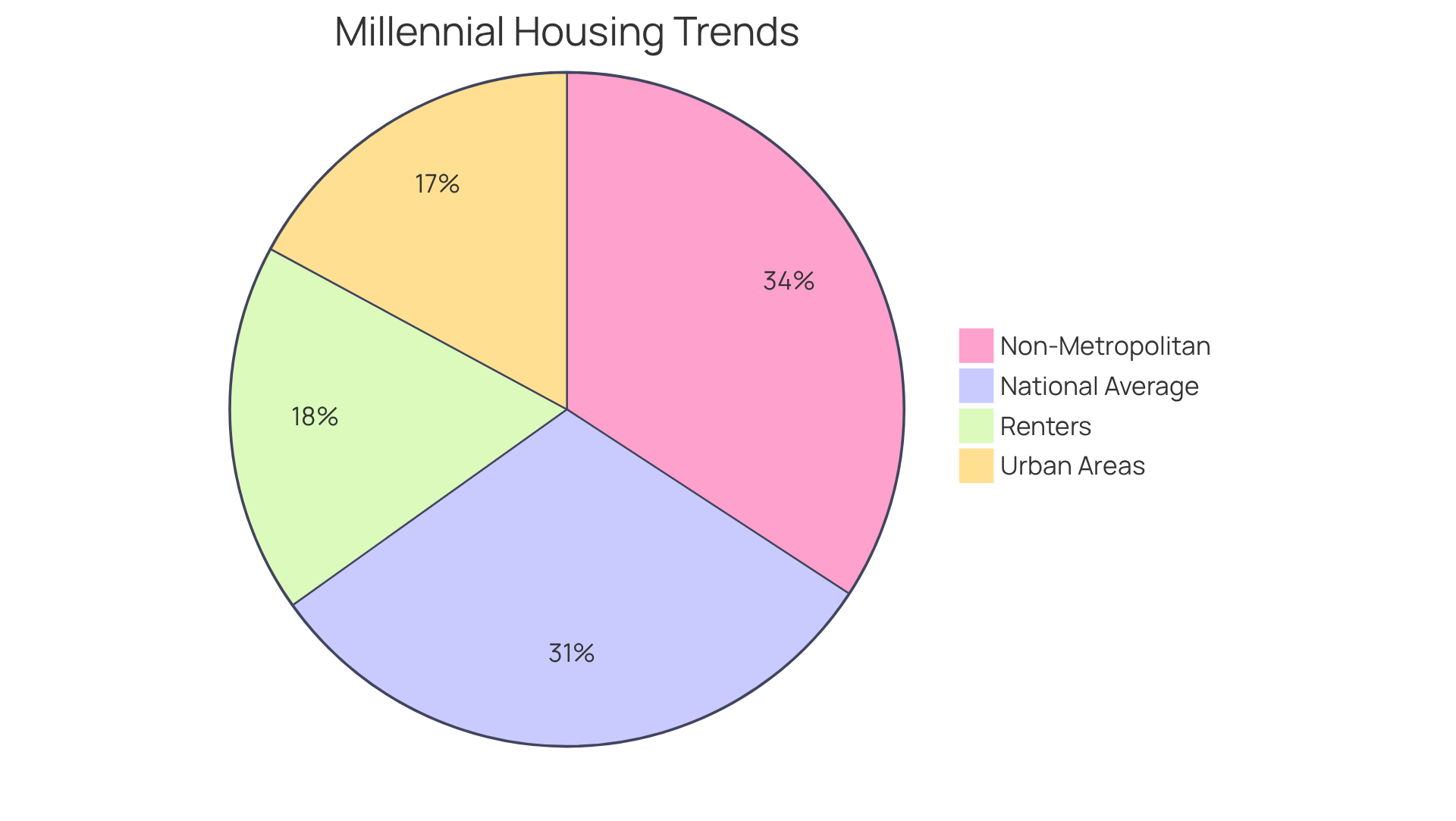
Value-Driven Purchases: The Importance of Brand Ethics to Millennials
The millennial buying habits indicate that they are increasingly prioritizing value-driven purchases, with a striking 83% favoring companies that align with their personal values. This trend underscores the critical role of ethical branding and (CSR) in shaping millennial buying habits.
To effectively connect with this demographic, companies must convey their values openly and actively engage in initiatives that resonate with young adults. For instance, companies that implement environmental improvement programs and demonstrate a commitment to social good can foster a sense of community and shared purpose among their audience.
Notably, 75% of Millennials say they definitely or probably would change their millennial buying habits to reduce their impact on the environment, highlighting the importance of CSR initiatives. Moreover, since 81% of Millennials anticipate companies to publicly pledge to good corporate citizenship, understanding millennial buying habits and incorporating CSR into the core business approach is not only advantageous but crucial for fostering loyalty and boosting sales.
Participating in community-oriented initiatives, such as aligning employee fundraising efforts—where one organization observed staff raise $6,000 for local nonprofits, which was matched to reach $12,000—can improve public perception and employee morale, further strengthening the bond with millennial buyers.
By aligning marketing strategies with these values, DTC brands can effectively tap into the growing purchasing power of Millennials and their millennial buying habits, which are projected to significantly influence market dynamics in the coming years, especially as an estimated $30 trillion in assets transfers from Baby Boomers to this generation.
As Andrea Brandon, Vice President of Marketing and Creative Services, aptly stated, 'To earn their business, give Millennials something to believe in and get behind.
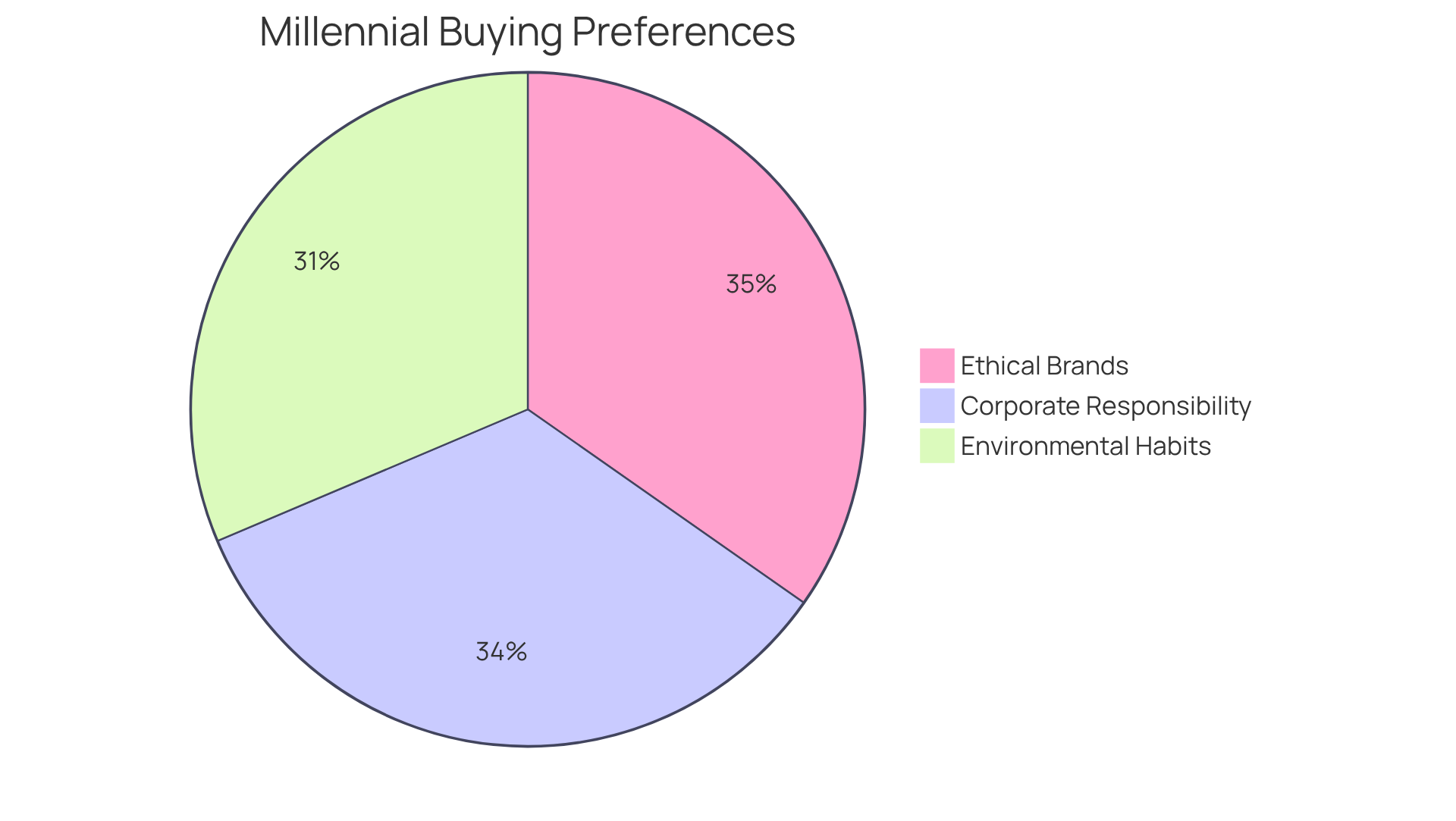
Financial Awareness: How Millennial Spending and Saving Habits Reshape Retail
Millennial buying habits demonstrate a pronounced financial awareness, often prioritizing savings and budgeting in their spending. This demographic tends to seek in their purchases, positioning them as selective buyers. According to Capital One Shopping, the average young adult's annual retail expenditure reaches $31,256, which is 6.16% higher than that of the average consumer, underscoring their commitment to quality.
Brands must focus on:
to establish trust and cater to the financial sensibilities of millennial shoppers. For instance, companies like Everlane emphasize openness in pricing and sourcing, resonating strongly with this audience. Furthermore, providing financial education can empower millennials to make informed choices, aligning with their pursuit of financial stability. As they navigate their financial landscapes, millennials increasingly prioritize savings, which significantly influences their millennial buying habits. In 2025, brands that adapt to these sensibilities will be strategically positioned to connect with this influential demographic.
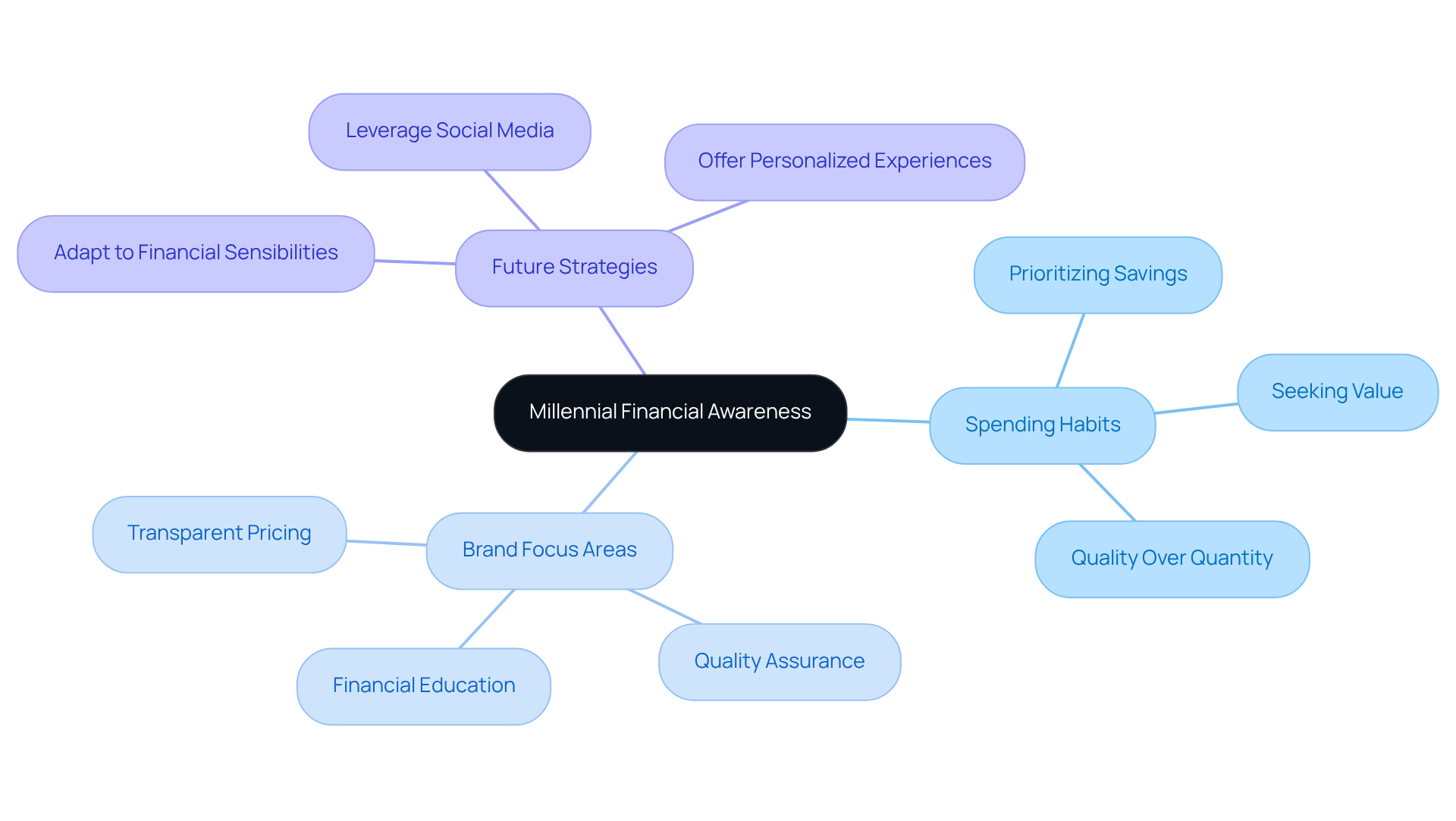
Conclusion
Understanding millennial buying habits is essential for DTC brands striving to excel in today’s competitive market. By recognizing the unique preferences and values of this influential demographic, brands can tailor their strategies to effectively engage and resonate with millennial consumers.
Key insights reveal that millennials prioritize:
- Experiences over products
- Convenience through subscription services
- Sustainability and ethical considerations
The rise of digital shopping and the influence of social media further underscore the necessity for brands to adapt their marketing approaches. Focusing on personalized experiences and transparent practices is crucial for building trust and loyalty.
As millennials continue to shape the retail landscape, it is imperative for companies to embrace these trends and align their offerings with the values of this generation. By doing so, brands not only enhance their market presence but also cultivate lasting relationships with consumers who are increasingly discerning and value-driven. Engaging with millennials effectively today will pave the way for sustained success in the future, as their buying habits and preferences evolve.
Frequently Asked Questions
What is Parah Group's role in relation to millennial buying habits?
Parah Group transforms millennial buying habits into effective strategies for DTC companies, enhancing conversion rates and average order values through data analytics and consumer psychology insights.
Can you provide an example of Parah Group's impact on a company?
A $30M apparel company worked with Parah Group to redesign its homepage, incorporating gamified progress bars and post-purchase upsells, resulting in a 35% increase in conversion rates and a 10% rise in revenue per visitor.
How did Grab Green benefit from working with Parah Group?
Grab Green, a $15M cleaning product company, experienced an 80% increase in average order value after implementing strategic pricing and bundling options recommended by Parah Group.
What values do millennials prioritize in their buying habits?
Millennials prioritize sustainability, wellness, and personalized experiences, which companies must align with to enhance marketing effectiveness and profitability.
What marketing strategies are effective for engaging millennials?
Effective strategies include targeted messaging, personalized product recommendations, and creating emotional connections through memorable experiences rather than just highlighting product features.
How do millennials view experiences compared to products?
Studies show that 72% of millennials prefer spending on events or activities over material goods, indicating a trend towards prioritizing experiences.
What are some successful examples of experiential marketing?
Lululemon's community-focused events and Airbnb's local experiences are notable examples that have effectively attracted millennials by aligning with their buying habits.
What is the significance of the subscription economy for millennials?
Millennials are leading the subscription economy, with 39% using subscription services for everyday needs, driven by a desire for convenience and flexibility.
How can brands leverage the subscription trend among millennials?
Brands can offer tailored subscription plans, curated boxes, and exclusive member benefits to enhance customer loyalty and engagement.
Why is understanding millennial buying habits important for DTC companies?
Understanding and integrating millennial preferences will be crucial for DTC companies aiming to thrive in a competitive landscape, especially looking ahead to 2025.
FAQs











